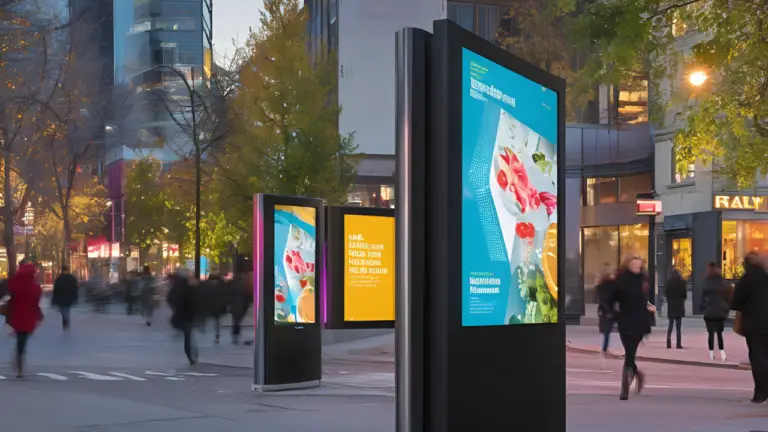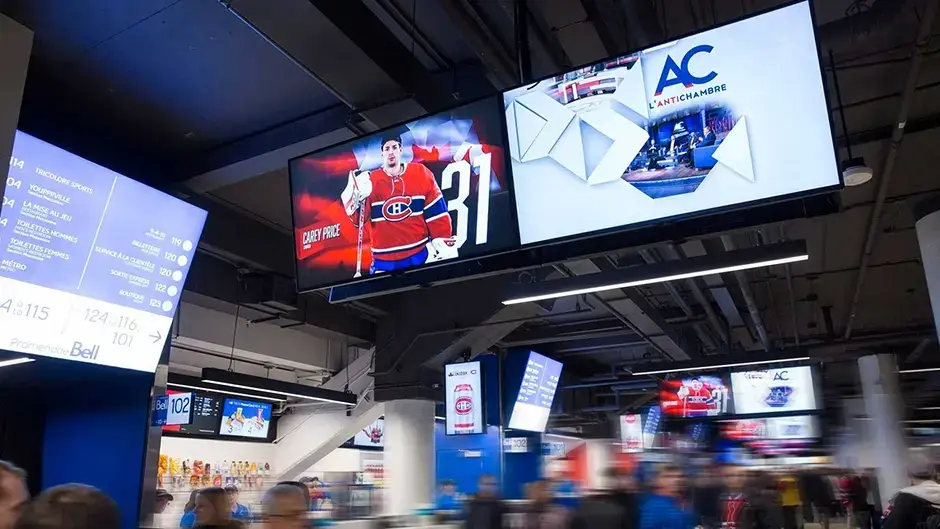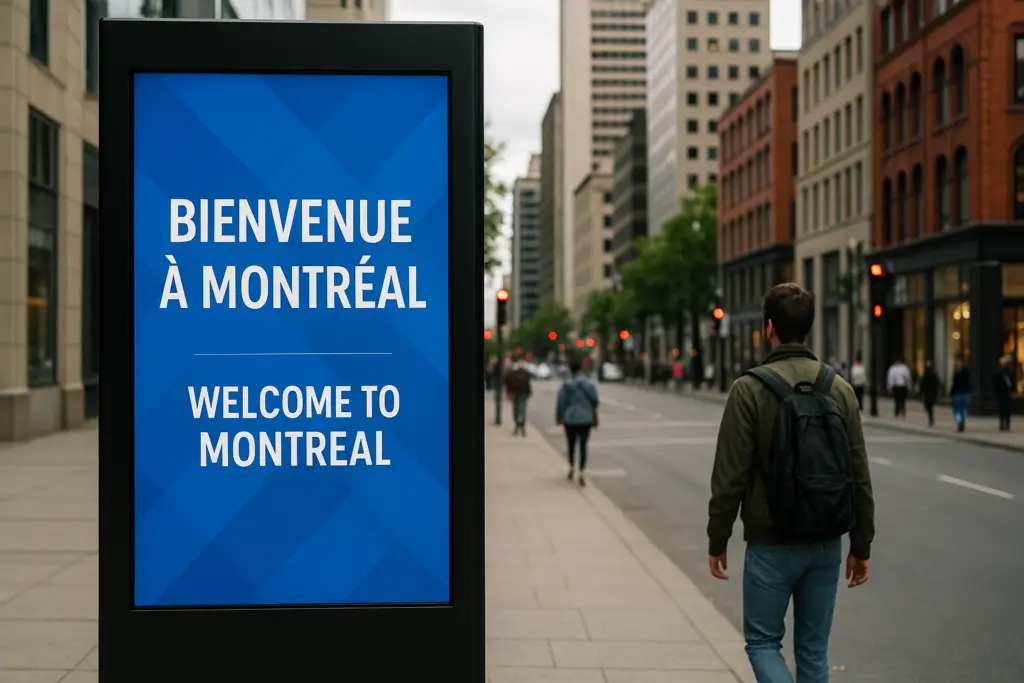Are you looking at solutions for digital signage in Montreal? As a leading digital signage consultant with deep knowledge of the Montreal market, I can help you navigate the local landscape and implement effective display systems that connect with your audience.
Why Montreal Businesses Need Digital Signage
Montreal is a city that moves fast, so your messaging needs to keep up. From bustling retail hubs on Rue Sainte-Catherine to sleek offices in the downtown core, digital signage is helping Montreal businesses stand out and connect.
Here’s what makes digital signage a smart move in this market:
Grab attention with stunning visuals that cut through the noise in busy commercial zones
Communicate fluently in French and English—serve every audience with ease
Update content instantly for seasonal promos, cultural events, or last-minute changes
Save money long-term by replacing print signage with flexible, reusable displays
Montreal has its own rhythm. With a bilingual audience, diverse communities, and a rich cultural backdrop, local businesses need signage solutions that can adapt. Digital signage gives you that edge, with messaging as dynamic as the city itself.

Montreal Digital Signage Market: Key Statistics
The adoption of digital signage in Montreal continues to grow:
- Over 65% of Montreal retailers now use some form of digital displays
- Public transit systems have increased digital signage by 40% since 2023
- 72% of Montreal shoppers report being influenced by digital displays
- Local businesses report a 24% increase in customer engagement with bilingual digital content
These numbers show that Montreal consumers respond well to digital displays, especially when content speaks to them in their preferred language.
Book A Free Consultation
Know The Regulations on Digital Signage in Montreal
Before you install any digital signage in Montreal, you need to understand the local rules. Zoning laws, language requirements, and brightness limits can vary by neighborhood—and ignoring them can lead to delays, fines, or forced takedowns.
Here’s what you need to know:
Zoning Laws Vary by Area
Montreal’s districts have different signage rules:
Downtown Core (Centre-Ville): Permits are required for digital displays over 2 square meters
Old Montreal (Vieux-Montréal): Extra restrictions apply—smaller screens, lower brightness, and heritage-friendly designs only
Commercial Corridors: Rules are more flexible, but a conformity certificate is still required
Brightness and Timing Restrictions
To reduce light pollution, the city enforces these limits:
Max brightness at night: 300 nits (from 10 PM to 7 AM)
Displays facing homes must dim 50% after 9 PM
Animated content can’t change more than once every 6 seconds in pedestrian-heavy zones
How to Get a Permit
Follow these steps for a smoother process:
Apply through your borough’s permit office
Submit technical specs for your signage
Include a photometric study to prove brightness compliance
Get approval from the property owner (if you’re leasing space)
Wait 3–4 weeks for review and final approval
Pro Tip:
Get it right the first time. Permitting mistakes can lead to expensive do-overs or lost marketing time.

Bilingual Considerations for Montreal Digital Signage
Montreal’s bilingual culture brings both complexity and opportunity when it comes to digital signage. Get it right, and you’ll connect with a wider audience while staying fully compliant with local laws.
Language Requirements You Can’t Ignore
The Office québécois de la langue française (OQLF) sets clear rules for commercial signage:
French must be first and given greater visual prominence (larger, bolder, or top-positioned)
All messaging must be available in French—no exceptions
English is allowed, but cannot overshadow French in size or placement
Fail to follow these guidelines, and you risk fines—or worse, reputational backlash.
Best Practices for Bilingual Digital Displays
To effectively engage Montreal’s bilingual population:
Use language toggles or rotating messages to display content in both French and English
Ensure enough display time for viewers to absorb both versions
Translate meaningfully—avoid word-for-word translations that miss cultural context
Incorporate universal symbols or icons to reduce text where possible
Well-executed bilingual signage builds trust—and shows respect for Montreal’s cultural identity.
How Tech Makes It Easier
Modern digital signage software can simplify bilingual content management:
Language-based scheduling: Rotate messages based on time of day or audience flow
Interactive displays: Let users choose their preferred language
Bilingual templates: Ensure consistent formatting and compliance
Sensors and AI: Adapt content based on location data or user input
Bottom Line:
Bilingual signage isn’t just a legal checkbox, it’s a chance to speak directly to your community. Done right, it shows you understand Montreal’s unique identity and helps your brand resonate across language lines.
Hardware Considerations for Montreal's Climate
Montreal’s climate is no joke. Icy winters, sweltering summers, and wild swings in between. If your digital signage isn’t built to handle it, you’re risking breakdowns, black screens, and costly repairs.
Here’s how to make sure your hardware survives (and thrives) year-round:
Winter-Proof Your Displays
Temperatures in Montreal regularly dip below -20°C, so your signage needs serious cold resistance:
Use displays rated for -40°C to keep content running, even during deep freezes
Add internal heating elements, especially for LCDs prone to freezing
Choose condensation-resistant enclosures to avoid foggy screens and moisture damage
Plan for snow loads when mounting rooftop units especially need extra structural support
Beat the Montreal Heat
Yes, we have hot summers too, and your digital signage hardware needs to stay cool and visible:
Pick high-brightness screens (2,000+ nits) for full sunlight readability
Install cooling fans or ventilation systems to prevent internal overheating
Use UV-resistant housings to stop plastic and graphics from fading or cracking
Ensure weather-sealed enclosures protect against sudden downpours
Why It Matters
Skimping on climate-rated hardware means shorter lifespans, more maintenance calls, and frustrated viewers. Investing in weatherproof digital signage up front pays off in long-term durability and performance.
Popular Digital Signage Locations in Montreal
Montreal is full of high-impact locations for digital signage—each with its own unique audience and strategic potential. Whether you’re targeting daily commuters, tourists, shoppers, or professionals, the city offers prime real estate for your screens.
Transit Hubs
Perfect for frequency and exposure:
Metro Stations – Reach thousands of daily commuters with real-time updates and branded messaging
Gare Centrale – Tap into a business-heavy crowd with time-sensitive, high-value content
Bus Shelters – Localized messaging in weatherproof enclosures, ideal for street-level engagement
Shopping Districts
Where purchase decisions happen:
Underground City (RÉSO) – A vast, climate-controlled network with year-round foot traffic
Rue Sainte-Catherine – Montreal’s busiest retail street, ideal for high-impact campaigns
Quartier DIX30 – A suburban mega-mall with a mix of families, professionals, and trend-savvy shoppers
Business & Innovation Hubs
Target high-value professionals and decision-makers:
Place Ville Marie – Premium signage space in the heart of Montreal’s business core
Technoparc Montréal – Showcase cutting-edge solutions to a tech-forward audience
Old Port Commercial Areas – Perfect for tourism-focused campaigns, especially in high season
Strategy Tip:
Each of these zones serves different demographics—adapt your content, design, and scheduling based on who’s watching and when.
Case Study: Successful Montreal Digital Signage Implementation
Restaurant chain La Belle Province saw impressive results after implementing bilingual digital menu boards:
- 23% increase in average order value
- 4.5 minutes reduced wait time during peak hours
- 78% of customers reported improved ordering experience
- Staff training time reduced by 35%
Their success came from a thoughtful approach:
- They conducted customer language preference surveys before implementation
- They used dayparting to show different language priorities by time of day
- They incorporated Montreal-centric imagery that resonated with locals
- They adjusted brightness automatically based on restaurant lighting
This case demonstrates how tailoring digital signage to Montreal’s unique characteristics drives better results.

Choosing the Right Digital Signage Partner
Digital signage isn’t one-size-fits-all—especially in a city like Montreal. To get it right, you need a partner who understands the local landscape, not just the technology.
When selecting a digital signage consultant or vendor in Montreal, look for:
Local Knowledge: They should be familiar with Montreal’s signage regulations, including OQLF language laws and permitting requirements.
Bilingual Support: Choose a team fluent in both French and English for smooth communication and fully compliant content.
Climate Expertise: Your partner should recommend and support hardware built to handle Montreal’s harsh winters and humid summers.
Cultural Awareness: Look for someone who understands Montreal’s diverse neighborhoods, bilingual audiences, and unique marketing rhythms.
The Bottom Line:
A great digital signage partner doesn’t just install screens. They help you avoid costly mistakes, stay compliant, and make your content truly connect with Montrealers. Choose wisely, and your screens will do more than display, they’ll deliver.
Ready to Launch Digital Signage in Montreal? Start with These 5 Smart Steps
Thinking about bringing digital signage into your Montreal business? Great move. Here’s how to do it right from the start:
Assess Your Needs
Define what you want to achieve. Are you boosting sales, sharing internal updates, or improving customer flow? Clarify your goals, target audience, and budget.Know the Rules
Montreal signage comes with strict regulations. Make sure you understand local permit requirements and OQLF language laws before going live.Plan Bilingual Content
Build a content strategy that speaks to everyone. French must lead, but English still matters. Think clearly, communicate inclusively, and follow best practices for language balance.Pick the Right Hardware
Montreal weather swings from -30°C to +30°C. Choose displays rated for both extremes, with proper enclosures and climate controls to match.Install and Test Thoroughly
Once your system is in place, run real-world tests. Check everything—from screen brightness and language rotation to touchscreen functionality and outdoor visibility.
Starting with a clear plan tailored to Montreal’s unique environment sets you up for success.
Contact a Montreal Digital Signage Expert
Looking to bring digital signage to your Montreal business? I’m here to help.
With 16+ years in the industry and hands-on experience in the Montreal market, I know what it takes to plan, launch, and support signage systems that are compliant, bilingual, and built for local conditions.
Let’s talk about how digital signage can help your business:
Communicate clearly in both French and English
Stay ahead of OQLF and city regulations
Engage customers with dynamic, weather-ready displays
Ready to get started?
Schedule your personalized consultation today—and let’s make your screens work smarter for Montreal.
FAQ
What are the benefits of digital signage for Montreal businesses?
Digital signage is more flexible and interactive than traditional signs. Businesses can update content instantly for events, promotions, or seasons, avoiding the need to reprint materials. In a busy city like Montreal, with frequent festivals and events, this real-time adaptability helps businesses stay relevant and draw in customers. Plus, digital signage can connect with mobile devices to offer personalized experiences, boosting customer engagement.
What regulations must Montreal businesses follow when using digital signage?
Montreal businesses must comply with local regulations regarding digital signage, including restrictions on brightness, placement, and content. Compliance with Quebec’s language laws is essential, meaning French must be prominently displayed in public communications. Partnering with a digital signage consultant ensures businesses stay compliant while maximizing the impact of their signage.


